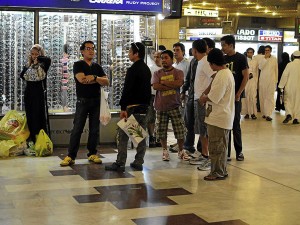
SAUDI FOREVER? Talk among overseas Filipino workers is turning to the possible effects of the Saudization program on them. Photo of Pinoys hanging out at the Balad mall in Jeddah by John Pamintuan
JEDDAH—The Saudi government’s announcement that it would hasten its program to replace expat workers with local hands is causing worries among many Filipinos and other expats working in this oil rich kingdom.
“It’s a wake up call,” said Romeo Reyes, a civil engineer in Jeddah.
Called the new “Saudization” or nationalization program, a new procedure aims to compel Saudi-owned and foreign companies to fast-track the hiring of more Saudi workers. Quotas have been set for the number of Saudi citizens employed by a company.
The quotas vary from five percent to 30 percent, depending on the company’s workforce and type of business. Companies with not more than 10 employees are exempted from the new “Nitaqat” system. Domestic workers are also not included in the program.
(Separate issues caused the recent halt to the deployment of domestic workers in Saudi Arabia. Ongoing discussions between Manila and Riyadh on this matter concern minimum wages and other working conditions required by the Philippines’ new Migrant Workers Act, among others.)
In the Saudization program, companies are classified into four color-coded categories—blue, green, yellow and red. Firms in the yellow and red categories are in the danger zone. They are required to meet their quotas in mid-September or shortly after that, or face penalties.
Green companies are those in the process of meeting their quotas, while blue companies are those who have already met their quotas. They will be given incentives.
Details unclear
It is not clear how the new system will be carried out but it has started to cause serious concern among expats who are worried that their jobs are threatened.
“My first reaction was that of alarm. They (Saudi officials) have been discussing this Saudization program for a long time… I feel they are serious this time,” says Sidney Diaz, a graphic artist at the Halawni Brothers, a food manufacturing company that has been operating in the Kingdom for more than 60 years.

MOVING TOGETHER Sidney Diaz (right) with wife Josie, sons Justin (left) and Brian in Jeddah. Is it time to relocate the family again?
His company falls in the yellow category and therefore has to meet its required quota or face sanctions, which early newspaper reports said would include refusal to renew the residence permits or iqamas of their foreign workers. That would force Diaz and other foreign workers either to go home or work illegally in the Kingdom.
Based on the classification and schedule posted by the Saudi Ministry of Labor on its website, the company where Diaz works should have at least 30 percent Saudi workers in its more than 1,000 workforce to pull itself into the green category.
“My first reaction was, naturally, it’s like, ‘this is it, it’s back home soon’ and so we have to assess our finances and what awaits us in the Philippines, things like that. But prayers calmed me down,” said Reyes, an engineer at the Noor Trading and Contracting Company.
Diaz and Reyes express confidence that their employers would make it to the green zone before the deadline comes. But the new nationalization program known in Arabic as Nitaqat, is seen as a wake-up call for the expatriates to start planning their homecoming.
“It’s a wake up call. It’s time to plan for the next five years from now,” said Reyes, whose family is with him in Jeddah.
Uncertain future
Diaz, whose family is also in Jeddah, said: “It reminds us that the future is uncertain and we may lose our jobs at a time we may not expect.”
A Saudi Gazette report on July 3 said the companies in the yellow category are given nine months from the time the new program was launched (June 11) to meet their quota, while those in the red zone have up to six months to do so.
In its June 29 issue, the Gazette said “the first stage of the Zone System… will continue on an experimental basis… (and) once the (grace) period ends, the ministry will start dealing with establishments that fall into the red and yellow category.”
It quoted a key labor official saying penalties come deadline time would be “critical for (the companies in the yellow and red zones) unless they correct their status.”
The Gazette said the Ministry of Labor will use the “stick-and-carrot” approach to deal with the private companies. This means they will wield both incentives and sanctions.
Companies in the blue or excellent zone and those in the green or qualifying zone will be given more incentives. Those in the yellow category and red categories will be penalized.
The Saudization program was first launched in 1974 but has been moving at a snail’s pace because private firms have been reluctant to hire Saudi workers, saying many of them don’t have the competencies they seek but demand higher wages than the expatriates.
Patnubay, a Riyadh-based volunteer group helping distressed overseas Filipino workers (OFWs), views the current nationalization program as a serious threat to the jobs of many expatriates.
It estimates that at least 60,000 OFWs would lose their jobs under the Nitaqat program. The computation is based on the assumption that 450,000 foreign workers would be streamlined to accommodate the same number of officially listed Saudi jobseekers and an equal number of workers from different countries would be replaced.
Patnubay said the number of Filipinos whose jobs are threatened could be more if ethnic and religious factors come into play in the retrenchment process and if many companies fail to meet their quotas.
A serious problem
GETTING READY Romeo Reyes, his wife Erly and daughter Paula Christine, another Jeddah based Pinoy family
“This is a serious problem that our government must take seriously,” said Joseph Espiritu, one of Patnubay’s active members. “Our government should start planning now instead of waiting for the problems to emerge before taking action.”
On the other hand, Rudy Dianalan, a community leader, believes highly skilled Filipino workers are not in peril of losing their jobs even if the new system is enforced strictly and hopes that only a few Filipinos will be affected by the new process.
“Only OFWs whose work can be taken over by Saudis are in danger of losing their jobs. Many OFWs are in positions that require specialized skills—like engineers, nurses, technicians, mechanics and the likes,” said Dianalan.
“There are also qualities that employers like about Filipino workers—their being hardworking, knowledgeable about the job, adequate in communication skills, and friendly, among others.”
“(Strict implementation of the Saudization program) would be a big burden for private businesses as Saudis will not accept the lower wages paid to Asian expat workers—like the OFWs, whose productivity make their operations cost-effective, said Dianalan.
“The Saudization program has been going on for so long but it has been difficult to implement. If they push through with it now, many businesses might just decide to close shop as they may not survive if forced to hire high-priced locals.
But like Diaz and Reyes, Dianalan said the situation is a reminder to OFWs to save as much as they can and prepare for a possible final exit.
Meanwhile, many OFWs who are due for vacation are reluctant to go home for fear that they might not come back following reports that immigration officers have stamped the passports of vacationing workers with “exit-only” visas.

